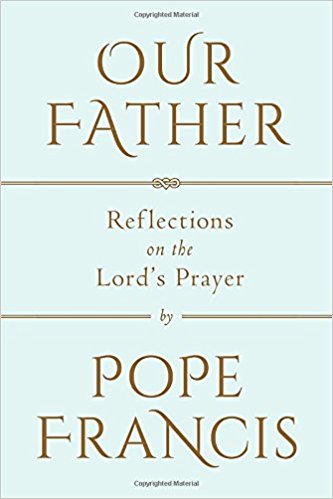Excerpts from ‘Our Father: Reflections on the Lord’s Prayer,’ released today.
Lenten Campaign 2025
This content is free of charge, as are all our articles.
Support us with a donation that is tax-deductible and enable us to continue to reach millions of readers.
As an editor at Penguin Random House, I had the great privilege of meeting Pope Francis at the Vatican in 2014 to present him with a special gift edition of The Joy of the Gospel, which we published that year. He was taller than I expected, and his eyes were lively and wide. As I put the book in his hands he smiled broadly and humbly, as if I was giving him a great treasure. We spoke for a couple of minutes and I distinctly remember feeling so comfortable being in his presence, as if I was speaking to my own father or grandfather.
Now a few years later, I’m beyond excited to be the editor of Pope Francis’ new book, which we are publishing on the fifth anniversary of his election to the papacy. Our Father: Reflections on the Lord’s Prayer captures a spiritually invigorating and lively conversation Pope Francis had with prison chaplain Father Marco Pozza at the end of last year, while highlighting some of Francis’ most cherished teachings on forgiveness and benevolence. In the pages of the book, the pope not only provides great insights on a prayer that many of us often take for granted, but also offers touching personal stories from his younger days.

As we approach Easter, we offer this sneak peak of a book that can help all of us, regardless of our differences, to renew our appreciation of our Father in heaven …
~
Pope Francis on “Our Daily Bread”
All of this, in the kingdom of God as recounted to us in the Gospel, happens while we are seated at table. Jesus uses this image often. The kingdom of God is always a celebration; we are at table, so he gives us something to eat. Whether it is a special occasion or an everyday meal, we are at table. The power of God’s presence in the world today is precisely at table, in the Eucharist with Jesus. This is why we ask that he feed all of us. Feed us with that spiritual food that strengthens us, at table in the Eucharist, but also feed everyone, in this world in which the reign of hunger is so cruel. When we pray the Our Father, it would be good for us to linger a bit over this petition—“give us bread today,” to me and to all—and to think about how many people do not have this bread. At home as children, when a piece of bread fell, my family taught us to pick it up right away and kiss it. Bread was never thrown away. Bread is a symbol of the unity of humanity; it is a symbol of God’s love for you, the God who feeds you. When it gets stale, what do moms and grandmas do with the bread? They soak it in milk, make it into a cake, they do something with it. Bread is never thrown away.
Pope Francis on “Mary’s Yes”
For us as well there is a salvation history made of yeses and nos. At times, however, we are experts in the “half yes.” We are great at pretending that we do not really understand what God wants and what conscience suggests to us. We even get crafty about it, and in order to avoid actually saying “no” to God we say, “Excuse me, I can’t,” “Not today, maybe tomorrow,” “Tomorrow I’ll be better, tomorrow I’ll pray, I’ll do good, tomorrow.” These attitudes and decisions distance us from the “yes.” They distance us from God and lead us to the “no,” to the “no” of sin, to the “no” of mediocrity.
All of this leads to closing the door on goodness. Evil takes advantage of the withheld “yes.” Each one of us has a collection of these inside. If we think about it, we will find many of these withheld yeses. Instead, every full “yes” to God gives rise to a new history. Sin makes us old inside. It ages us fast! But saying “yes” to God is literally original. Every “yes” to God originates histories of salvation for us and for others. Like Mary, with her “yes.”
God wants to visit us and is waiting for our “yes.” Let us keep in mind what “yes” we should say to God today. It will do us good to think and live this way. We will find within us the voice of the Lord, who is asking us for something, a step forward. We all need to say, “I believe in you, I hope in you, I love you; may your will for good be fulfilled in me.” This is the “yes.” With generosity and trust, like Mary, let us say today, each one of us, say “yes” to God.
~
Get the book here.
We are a participant in the Amazon Services LLC Associates Program, an affiliate advertising program designed to provide a means for us to earn fees by linking to Amazon.com and affiliated sites.








